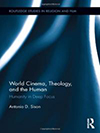- Author(s): Yelena Biberman,Sahar Gul &Feryaz Ocakli
- When: 2016-07
- Where: Asian Affairs: An American Review
Pakistan's religious television programs have drawn significant attention in both academic and policy circles. However, there has been surprisingly little systematic analysis of their content and influence. This article shows that, although the televangelists featured on the Pakistani television channels present some of the most conservative views regarding the role of women and religious minorities in society and the role of Islam in governance, Pakistani television is an arena of contestation. The impact of the lively debates between televangelists on young viewers—over whom the ideological battles are being waged—is mixed. Findings from an original survey of Pakistani students and political activists suggest that young people in Pakistan watch religious shows only occasionally. Those that do, however, take them seriously. What leads young people to consume religion on television is a sense of social responsibility: that they are doing it not just for themselves, but also—and perhaps more importantly—for others, be it their families or communities.








